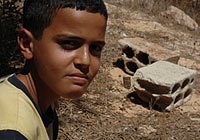For Lebanese children, the homefront is a landscape mined with dangers

http://www.unicef.org/emerg/index_35418.html
For Lebanese children, the homefront is a landscape mined with dangers
© UNICEF/HQ06-1172/Debbas
Two days after the ceasefire between Israel and Hezbollah took effect, a child sat next to an unexploded cluster bomblet in Yohmor, Lebanon.
By Simon Ingram
TYRE, Lebanon, 23 August 2006 – Sikuna Marei, 12, lies in the intensive care unit of Tyre’s Jebel Amel hospital. Even the oxygen mask she’s wearing can’t conceal the pain she suffers from the wound where doctors removed a jagged piece of shrapnel from her liver.
Sikuna, her 10-year old cousin Hassan, who lies under heavy sedation in the bed next to hers, and a third child, Marwa, were among the first victims of what could well become the most deadly legacy of the 34-day war in Lebanon.
The three children were not injured during the savage fighting that transformed much of their home village of Ait al Shaab into rubble, but instead were hurt on the day after the ceasefire between Israel and Hezbollah took effect.
They were playing near their homes and came across a small metal cylinder, no more than a few inches in length, lying amid the debris. It was Marwa who picked up the strange object – and Sikuna who instantly sensed the danger.
“We told her to throw it away,” said Sikuna, her voice a low whisper. “But then it exploded. I felt pain in my stomach. There was smoke everywhere and I saw there was blood pouring from me.”
© UNICEF/HQ06-1168/Debbas
Marwa, 11, from Ait al Shaab, Lebanon, is treated in hospital for injuries from a cluster bomblet that exploded while she and her cousins were playing with it.
Cluster bombs lying in wait
Within the first week of the ceasefire, bomb disposal teams found thousands of unexploded cluster bombs in over 50 locations in Lebanon. More than 200 were recovered in and around the hospital in Tibnin. Others have turned up in streets, fields and even people’s homes, together with a range of other bombs, shells and missiles.
The cluster bombs were fired by Israeli artillery guns, packed in shells that are designed to split open in flight, scattering the deadly contents onto the enemy forces below. However, as is often the case, it is now clear that large quantities failed to explode on impact and are now lying in wait for anyone unlucky or unwise enough to disturb them.
Experience in other conflict zones has shown that it’s the young who are particularly at risk – not least because the slightest movement can trigger an explosion.
“They look like fat torch batteries. So they seem innocuous, especially to the curious mind of a child,” said the United Nations Mine Action Service’s Chris Clark. “They’re small, they easily conceal themselves amongst all the rubble or the debris of the bombing. We find that children unwittingly pick them up and then, sadly, suffer injuries from them.”
© UNICEF/HQ06-1178/Debbas
Boy stands in front of his destroyed home on the road to Bint Jbeil, southern Lebanon.
Campaign to save lives and limbs
The director of Jebel Amel hospital, Dr. Ahmed Mrowe, says his doctors are already treating eight cases of serious injury caused by cluster bombs, including six children. Another victim was a soldier who lost a foot. Other casualties are being reported daily from across south Lebanon. It’s feared that when farmers and their families start returning to work in the fields to harvest the tobacco and olive crop, many more injuries will result.
In response, UNICEF – along with a range of national and international partners – last week launched a nationwide public-awareness campaign warning of the dangers from unexploded munitions. Posters and leaflets, as well as radio and television advertisements, warn people against touching any unexploded munitions they find and urge them to report any such discoveries to the authorities.
It is hoped the campaign will spare thousands of other children the injuries that nearly cost Sikuna her life – and in the process, ensure that a deadly legacy of Lebanon’s latest war is contained.

0 Comments:
Post a Comment
<< Home